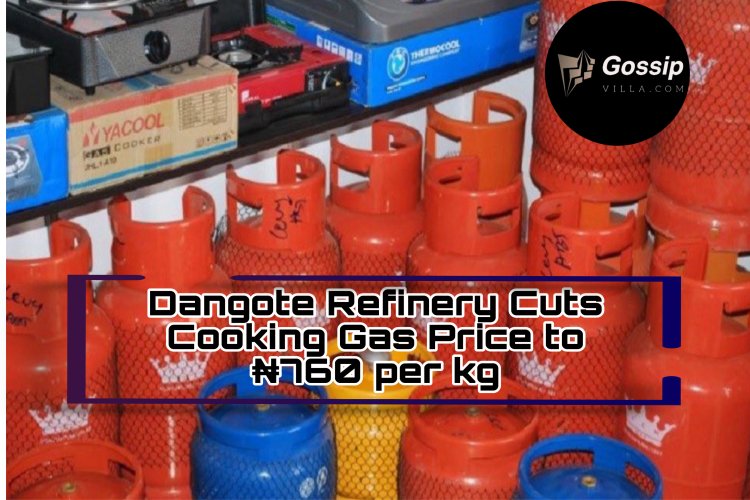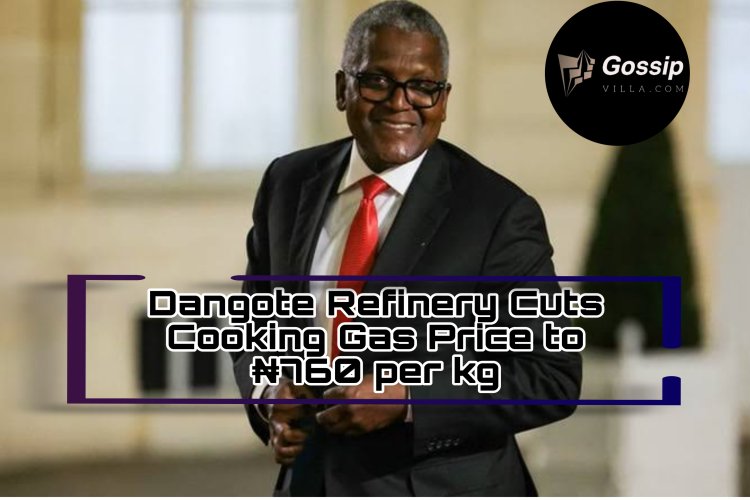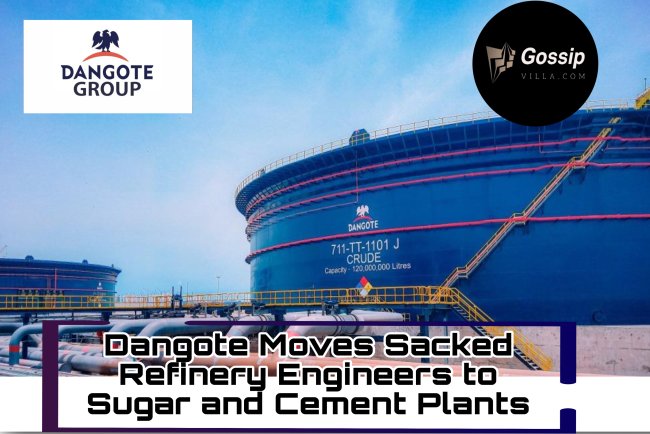Dangote Refinery Cuts Cooking Gas Price to ₦760 per kg
Dangote Refinery has slashed its cooking gas (LPG) ex-depot price from ₦810 to ₦760 per kg, offering relief to Nigerian households amid high inflation.

Dangote Refinery Cuts Cooking Gas Price to ₦760 per kg
In a move that’s bringing smiles to households across Nigeria, the Dangote Petroleum Refinery has slashed the ex-depot price of cooking gas (LPG) from ₦810 per kilogram to just ₦760 per kg. This reduction, announced recently, comes at a time when many families are feeling the pinch of rising living costs. It’s a welcome relief for millions who rely on cooking gas for daily meals, and it positions Dangote as the cheapest supplier in the market. If you’re tired of high gas bills, this could mean lower prices at your local dealer soon.
Let’s break it down simply – what this means, why it happened, and how it affects you.

What Exactly Happened?
The Dangote Refinery, Africa’s largest single-train refinery located in Lekki, Lagos, is now producing and supplying liquefied petroleum gas (LPG), commonly called cooking gas. Just a few days ago, the company dropped the price at which it sells gas to distributors (the ex-depot price) by ₦50 per kg. Before this cut, Dangote was charging ₦810 per kg, which was already lower than competitors like Ardova and Nipco, who sell at ₦910 to ₦920 per kg. Now, at ₦760 per kg, Dangote is leading the pack and making it harder for others to compete.
This isn’t the first time Dangote has made waves with pricing. Earlier this year, the refinery cut petrol prices multiple times, from ₦950 to ₦890 per litre, and later to ₦820 per litre, showing a pattern of passing on savings to consumers. For cooking gas, this slash follows a period of scarcity caused by refinery maintenance and union strikes, which had pushed prices up temporarily. With the refinery back online, supply is stabilizing, and prices are dropping.
Why Did Dangote Make This Cut?
Aliko Dangote, the billionaire behind the refinery, has long promised to make fuel and gas more affordable for Nigerians. The refinery started full operations in early 2024 and is designed to produce 650,000 barrels of refined products per day, including LPG. By cutting costs, Dangote aims to undercut importers and other local suppliers, encouraging more people to buy from its network. Experts say this is part of a bigger strategy to reduce Nigeria’s reliance on imported gas, which often drives up prices due to dollar fluctuations and shipping costs.
In recent months, global oil prices have dipped slightly, and the naira has shown some stability, allowing the refinery to lower its rates without losing money. Plus, with more independent marketers joining Dangote’s distribution list – companies like TotalEnergies and Sunbeth Energies – the supply chain is growing, which helps keep prices low. It’s a win-win: Dangote sells more, and Nigerians pay less.
How Will This Affect Everyday Nigerians?
Let’s talk real impact. Cooking gas is a staple in Nigerian homes – from jollof rice to boiling yam, it’s essential. A standard 12.5kg cylinder used to cost around ₦10,125 at ₦810 per kg from Dangote depots. Now, at ₦760 per kg, that’s about ₦9,500 – a savings of ₦625 per refill. For smaller 6kg cylinders, popular in rural areas, the drop is from ₦4,860 to ₦4,560, saving ₦300 each time.
Retail prices won’t drop overnight, but dealers are already announcing reductions. In Lagos and Abuja, some shops are selling 12kg cylinders for ₦11,000 to ₦12,000, down from ₦13,000+. In the south-south and north, where transport costs add up, expect similar ripples within days. This could ease the burden on low-income families, who spend up to 20% of their budget on cooking fuel. Women, who often manage household budgets, stand to benefit most – less money on gas means more for school fees or food.
But it’s not all smooth. Some dealers worry about slim margins (just ₦100-₦150 per kg now), which might lead to slower refills during peak times. Still, overall, this is positive news amid Nigeria’s inflation rate hovering above 30%.
Broader Picture: A Boost for Nigeria’s Economy
The Dangote Refinery isn’t just about cheaper gas; it’s transforming Nigeria’s energy sector. Before it came online, the country imported 90% of its refined products, costing billions in foreign exchange. Now, local production is saving dollars and creating jobs – over 10,000 direct and indirect roles. Cheaper LPG could also spur small businesses, like food vendors and restaurants, to grow without fuel worries.
Social media is buzzing with praise. On X, users are calling it “Dangote magic” and sharing tips on where to refill cheaply. However, some call for government action to ensure the savings reach remote villages, where logistics remain a challenge.
What’s Next for Cooking Gas Prices?
Experts predict more cuts if global trends continue. Dangote has hinted at direct sales to retailers, bypassing middlemen to keep prices even lower. Watch for updates from the Nigerian Midstream and Downstream Petroleum Regulatory Authority (NMDPRA), which oversees pricing.
As Nigeria pushes for energy self-sufficiency, families can breathe a little easier at the stove.
Stay tuned for more on how this unfolds.
News Source
What's Your Reaction?




















